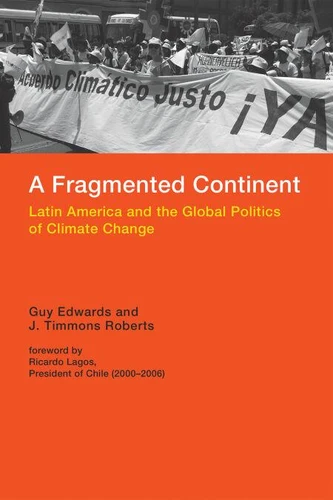A Fragmented Continent. Latin America and the Global Politics of Climate Change
Par : , ,Formats :
Disponible dans votre compte client Decitre ou Furet du Nord dès validation de votre commande. Le format ePub protégé est :
- Compatible avec une lecture sur My Vivlio (smartphone, tablette, ordinateur)
- Compatible avec une lecture sur liseuses Vivlio
- Pour les liseuses autres que Vivlio, vous devez utiliser le logiciel Adobe Digital Edition. Non compatible avec la lecture sur les liseuses Kindle, Remarkable et Sony
- Non compatible avec un achat hors France métropolitaine
 , qui est-ce ?
, qui est-ce ?Notre partenaire de plateforme de lecture numérique où vous retrouverez l'ensemble de vos ebooks gratuitement
Pour en savoir plus sur nos ebooks, consultez notre aide en ligne ici
- Nombre de pages304
- FormatePub
- ISBN978-0-262-33016-9
- EAN9780262330169
- Date de parution27/11/2015
- Protection num.Adobe DRM
- Taille560 Ko
- Infos supplémentairesepub
- ÉditeurThe MIT Press
Résumé
How Latin American countries became leading voices and innovators on addressing climate change-and what threatens their leadership. Latin American countries have increased their influence at the United Nations climate change negotiations and offered potential solutions on coping with global warming. But in the face of competing priorities, sometimes these climate policies are jettisoned, undermined, or simply ignored.
A Fragmented Continent focuses on Latin America's three major blocs at the U. N. climate negotiations and how they attempt to balance climate action with building prosperity. Brazil has reduced its deforestation but continues its drive for economic growth and global recognition. A leftist group led by Venezuela, Bolivia, and Ecuador decries the injustice of climate change but is highly dependent on the export of fossil fuels.
A new group, including Chile, Costa Rica, and Peru and supported by Mexico, offers sharp reductions in their carbon emissions in return for greater action by others; these countries now have to deliver on their promises. Weaving together issues of politics and economy, trade, foreign policy, civil society, and environmental protection, A Fragmented Continent offers a long-missing perspective on one of this century's greatest challenges and neglected regions.
A Fragmented Continent focuses on Latin America's three major blocs at the U. N. climate negotiations and how they attempt to balance climate action with building prosperity. Brazil has reduced its deforestation but continues its drive for economic growth and global recognition. A leftist group led by Venezuela, Bolivia, and Ecuador decries the injustice of climate change but is highly dependent on the export of fossil fuels.
A new group, including Chile, Costa Rica, and Peru and supported by Mexico, offers sharp reductions in their carbon emissions in return for greater action by others; these countries now have to deliver on their promises. Weaving together issues of politics and economy, trade, foreign policy, civil society, and environmental protection, A Fragmented Continent offers a long-missing perspective on one of this century's greatest challenges and neglected regions.
How Latin American countries became leading voices and innovators on addressing climate change-and what threatens their leadership. Latin American countries have increased their influence at the United Nations climate change negotiations and offered potential solutions on coping with global warming. But in the face of competing priorities, sometimes these climate policies are jettisoned, undermined, or simply ignored.
A Fragmented Continent focuses on Latin America's three major blocs at the U. N. climate negotiations and how they attempt to balance climate action with building prosperity. Brazil has reduced its deforestation but continues its drive for economic growth and global recognition. A leftist group led by Venezuela, Bolivia, and Ecuador decries the injustice of climate change but is highly dependent on the export of fossil fuels.
A new group, including Chile, Costa Rica, and Peru and supported by Mexico, offers sharp reductions in their carbon emissions in return for greater action by others; these countries now have to deliver on their promises. Weaving together issues of politics and economy, trade, foreign policy, civil society, and environmental protection, A Fragmented Continent offers a long-missing perspective on one of this century's greatest challenges and neglected regions.
A Fragmented Continent focuses on Latin America's three major blocs at the U. N. climate negotiations and how they attempt to balance climate action with building prosperity. Brazil has reduced its deforestation but continues its drive for economic growth and global recognition. A leftist group led by Venezuela, Bolivia, and Ecuador decries the injustice of climate change but is highly dependent on the export of fossil fuels.
A new group, including Chile, Costa Rica, and Peru and supported by Mexico, offers sharp reductions in their carbon emissions in return for greater action by others; these countries now have to deliver on their promises. Weaving together issues of politics and economy, trade, foreign policy, civil society, and environmental protection, A Fragmented Continent offers a long-missing perspective on one of this century's greatest challenges and neglected regions.



